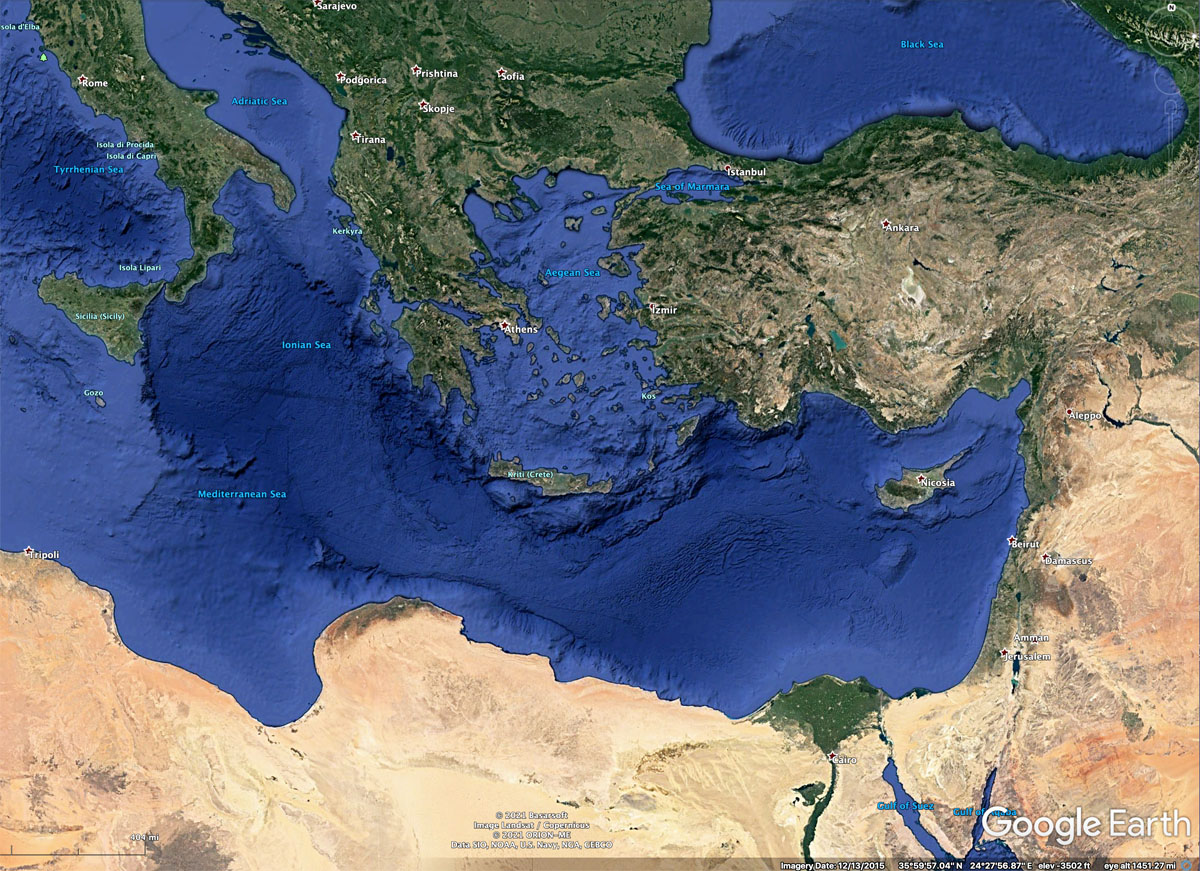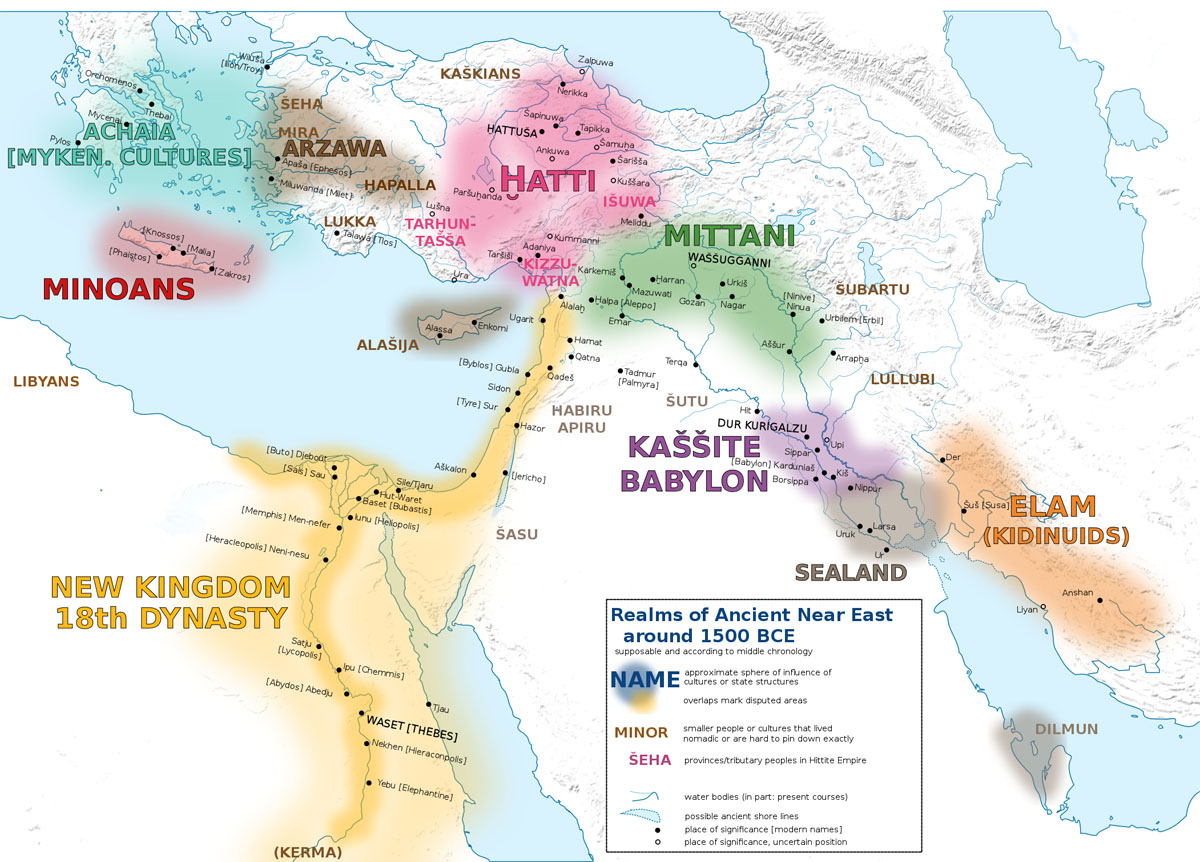
The Mediterranean today. Google Earth. Click here for high-resolution version.
1177 B.C.: The Year Civilization Collapsed. Eric H. Cline. Princeton University Press and Oxford University Press, 2021. 278 pages.
Reading about ancient history before the time of the classical Greeks is a challenge. We want a reasonably clear narrative and a good story. But the problem is that we don’t know enough about what happened 3,000 years ago for a clear narrative. All we get is a big mosaic of random pieces, with most of the pieces missing. No clear narrative emerges. But we continue to learn about ancient history, and so quickly, that this book, originally published in 2014, was revised in 2021.
Books from Oxford University Press (and certainly from Princeton as well) can be very dry reading. But the Oxford press in particular has a knack for finding academics who can write for non-academic (though motivated) readers. Eric Cline is a professor of classics and anthropology at George Washington University. His device for making this book more readable is to treat it as a mystery. That’s fair, because the history of high civilization in the Mediterranean and how it ended is a mystery. The year 1177 B.C. is arbitrary, of course. Cline chose that year because that is the year that Egypt, under the pharaoh Ramses III, was invaded by the “Sea Peoples,” and the long era of Egyptian power came to an end.
The kingdoms of the eastern Mediterranean were rich and powerful — Egyptians, Hittites, Mycenaeans, Canaanites, Cypriots. Each kingdom fell, quickly, like dominoes. There followed a dark age, out of which new civilizations arose — Israelites, Aramaeans, Phonenicians, Athenians, Spartans.
Because Cline wrote this book as a mystery, I think I will not get into what he has to say about what caused the collapse, insofar as we even understand what caused the collapse. The pleasure of this book is in becoming interested in the mystery. For a long time, what we knew about this period was learned only through archeology and from the thousands of cuneiform clay tablets that have been found all over the eastern Mediterranean. I had no idea, actually, that so many tablets survived. Many are mundane — inventories, or ships’ manifests. But the rulers of those kingdoms wrote each other lots of letters (on clay tablets), and many of them survive. At least one language has not been deciphered. Other tablets are still being translated and published. In addition to the new material from newly discovered and newly translated clay tablets and the ongoing work in archeology, new types of data are becoming available — DNA studies (from DNA recovered from bones), climate studies, and data on ancient disease pathogens. The history of the ancient Mediterranean is still very much being written.
Clearly some historians including Cline would like for us to know more about ancient history because there are parallels with today’s world that might serve as warnings. That’s fine. But historians are as unlikely to agree on the lessons to be learned as they are to agree on why a civilization fell. Cline makes reference to one historian whose view is that maybe it was a good thing that palace power in the Mediterranean collapsed, leaving room for experiments with different sorts of cultures and governments and a wider (if only slightly) distribution of wealth and power.
As for the warnings, did the ancients have any?:
“Many questions still remain unanswered, however. We do not know whether the various entities (Hittites, Mycenaeans, Egyptians, etc.) knew they were in the midst of a collapse of their society. We do not know whether there were organized efforts to evaluate and remedy the overall evolving situation and look to the future. We do not yet have any indications in the archaeological remains or textual records that anyone at the time was aware of the larger picture.
“And, even if they did know, could the leaders of the individual societies have done anything to slow the spread of decay or to prevent the ultimate collapse? There were certainly individual efforts to counter the effects of famine and drought (e.g., grain ships sent by the Egyptians; possible breeding of drought-resistant cattle and crops in the Levant), but apparently they were for naught. It has been pointed out elsewhere, though, that in virtually all such previous collapses, ‘there were sages or scholars who had a reasonably good understanding of what was happening and how it might be avoided.’ However, ‘If they were listened to at all … their advice was typically followed too little and too late.'” (The quotation inside this quotation is attributed, in the notes, to Thomas D. Hall.)
You will need some good maps while reading this book, and by the time you’ve finished it your Mediterranean geography will be quite good. There are two maps in the book, but they’re not great.

The Mediterranean in the Bronze Age. Source: Wikimedia Commons. Click here for high-resolution version.

There seems to be a parallel with todays societies at not listening to ‘there were sages or scholars who had a reasonably good understanding of what was happening and how it might be avoided.’ However, ‘If they were listened to at all … their advice was typically followed too little and too late.’”